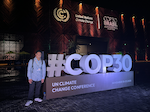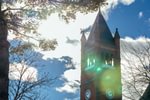

Access to education has never been more critical as people around the world view it as the great equalizer across social, economic, and cultural boundaries.
Anthropology and political science double major Anthony Wagner ’17 was able to witness the power of this access first hand while studying abroad in South Africa. He was so inspired by his experience—and the role he witnessed community-based non-government organizations (NGOs) playing in order to increase access to education—that he returned to South Africa a year later to focus his anthropology honors thesis on the subject.

Anthony Wagner ’17 at the top of Table Mountain in Cape Town.
He is interning with Umkhumbane Schools Project (USP) in Durban, South Africa, one of the NGOs he is focusing his research on. When he isn’t working on his internship duties—like organizing a Youth Day History Festival—he’s meeting with leaders in the field of education and conducting interviews with teachers, school administrators, and NGO staff members alike.
“In cases where government-funded schools are failing to provide the education that students need, NGOs often step in as the middle man to provide the quality of education and funding resources that so many schools need,” Wagner explained. “Being on the ground, interacting with the people who are directly impacted by or working with these issues—I knew it would be an incredible experience.”
Becoming a global citizen
Despite how strongly his experiences in South Africa have influenced his academic research, Wagner didn’t think much about studying abroad when he first came to Gettysburg. Having grown up on a family farm, Wagner had never even been outside of the United States until he was asked to participate in an archaeological excavation with classics prof. Carolyn Snively’s research team—in Macedonia.
“I wasn’t planning to study abroad until I started talking with Professor Snively about her research in Macedonia,” Wagner explained. “I was in her class for a few semesters and knew she was taking students with her in order to work on her research team. Not only did she invite me to join, but she got me thinking about studying abroad, too.”
A sophomore, Wagner scheduled an appointment with the Center for Global Education. After discussing his interests in cultural anthropology and comparative politics with Director of the Center for Global Education Rebecca Bergren, he learned about an SIT program on social and political transformation in South Africa.
He applied, was accepted into the program, and soon found himself preparing for both a month-long research trip to Macedonia, and shortly after that, a semester-long study abroad experience in South Africa.

Anthony Wagner interacts with colleagues in the narthex of the basilica at prof. Snively's excavation site in Konjuh, Macedonia while workmen search for evidence of a grand entrance to the structure.
“I’ll never forget that moment right after the plane had taken off,” Wagner said of his trip to Macedonia. “It was the first time I had ever flown or left the country, and it would be the longest I would ever be away from my family. I didn’t know what to expect, but it was such an exhilarating feeling, knowing that I was going somewhere I had never been before.”
He spent the summer working closely with Snively and learning about archaeology first-hand in the field. He also saw himself thrust into the middle of debates he had only ever read about in the news.
“I was able to take a two-day trip to Greece right when the immigration and refugee crisis was boiling over,” Wagner explained. “I had read about all of this on the news, but here I was sitting right next to a group of refugees on the train. The country was also voting about whether to stay in the EU at the same time, and I just happened to be where all of these big things in the world were taking place.”
Learning in the field
After a brief return home, Wagner packed his bags once more for his semester-long program in South Africa.
Instead of spending each day in class, the program focused on week-long themes. Students attend thematic lectures from political leaders and advocates, take field trips, and interact with people who hold a wide array of perspectives related to those themes. All of the students in Wagner’s program stayed with three different host families throughout the program in order to truly understand the diversity of cultures and perspectives found in the country.
“It was a very experiential learning experience,” Wagner said.
One of the week-long themes focused on education, which was when Wagner first visited USP and other NGOs working to bridge the education gap in their local communities. When he later began thinking about combining his study abroad experience with his anthropology honors thesis, he reached out to the connections he had made at USP and was thrilled to be offered an internship for the summer.

Anthony Wagner helps students work on a science practicum focused on electrical currents at Bonela Secondary School in Durban, South Africa, as a part of his summer internship.
He worked with profs. Julia Hendon and Donna Perry to outline his research goals and find funding from the Provost’s Office and the anthropology department, and booked a plane ticket to go back to South Africa once more.
And while his research is still underway, he feels confident drawing one early conclusion.
“Since the end of apartheid and the beginning of democracy 22 years ago, South Africa has showcased its education system as proof that apartheid is long since dead,” Wagner stated. “Although progress has been made, I would argue that the current state of basic and higher education in South Africa is rather evidence that vast racial inequalities live on.”
Looking to the future
Wagner’s travels abroad are far from over when his internship ends in August. Instead, he will be continuing on to Jiangyin, China, where he will be teaching a three-week course on conversational English and topics in American society.
His hope is to use these experiences as the foundation for an application for a Fulbright English Teaching Assistantship in Macedonia.
“When I was in high school, my pipe dream was to become a U.S. senator,” Wagner said. “The experiences I’ve had here and the courses I’ve been able to take haven’t limited me to any one particular path. I could see myself going into academia, or working in politics in a number of different capacities. It’s kind of scary, but it’s also pretty satisfying, too.”


